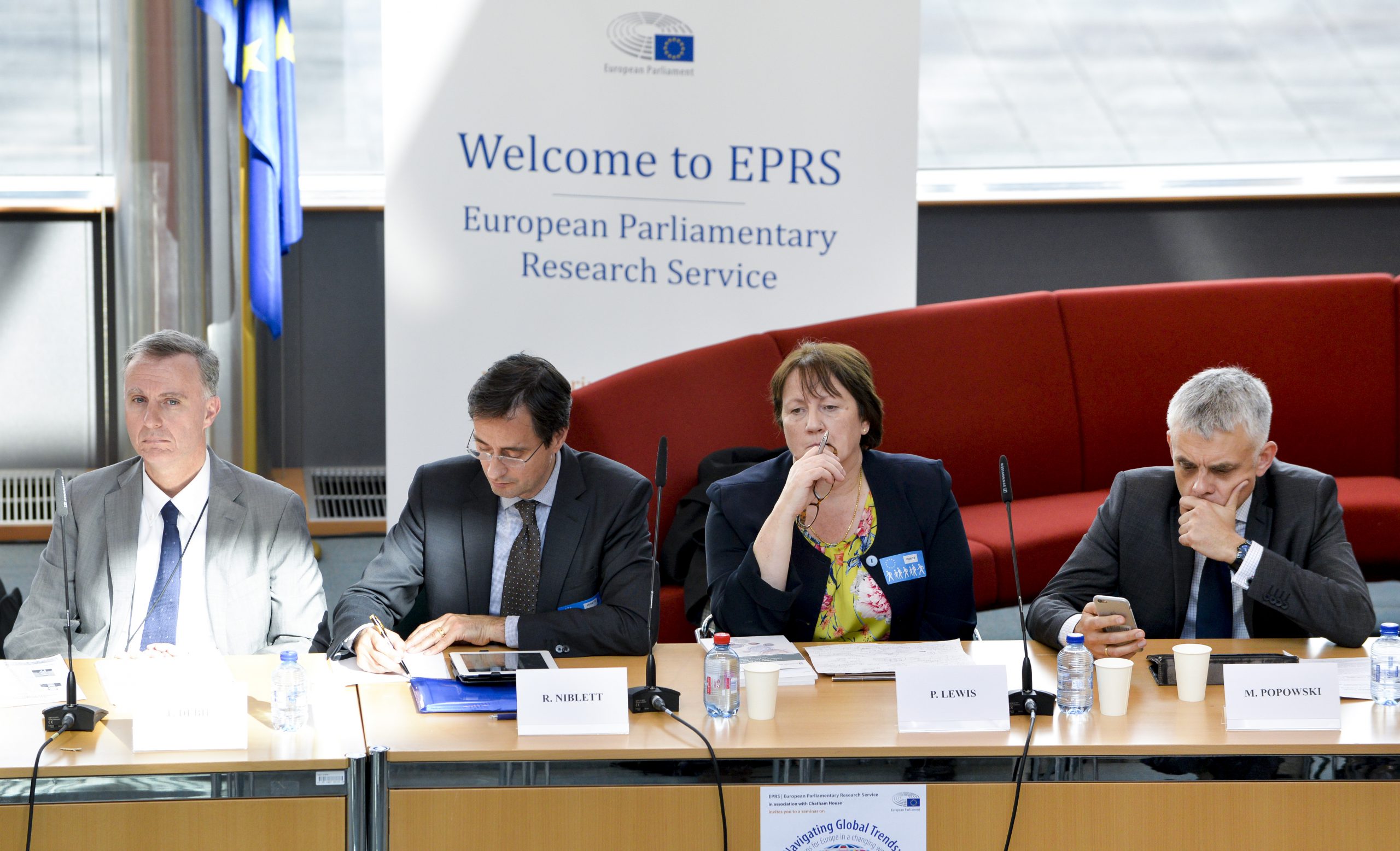Written by Marcin Grajewski
With global social, technological and economic trends working against it, the EU is unlikely to turn into a superpower in the next 15 years, but it can and should become ‘a superpartner’ in a polycentric world helping to underpin a rule-based global order. The European Union can arrest its possible decline on the global stage if it opens up to the outside world with confidence, beefs up its military power and harnesses the huge potential of its single market, trade, aid and foreign policy, according to analysts and politicians who spoke at a conference organised by the European Parliamentary Research Service and Chatham House.

for Europe in a changing world
The seminar, entitled ‘Navigating Global Trends: Options for Europe in a Changing World‘, gathered MEPs, officials, analysts and researchers in the European Parliament’s Library Room on 15 June 2015. It was the EPRS first event organised under the newly re-launched ESPAS, or ‘European Strategy and Policy Analysis System’ – an inter-institutional project focused on improving understanding of the EU’s strategic options. Two experts from Chatham House – its Director, Dr Robin Niblett, and Research Director, Dr Patricia M Lewis – presented their findings based on a report co-authored by Chatham House on ‘Empowering Europe’s Future: Governance, Power and Options for the EU in a Changing World’. These were challenged by active diplomats: Maciej Popowski, Deputy Secretary General of the European External Action Service, and Elmar Brok, Chairman of the European Parliament’s Committee on Foreign Affairs.
According to the speakers, the EU’s self-confidence and willingness to engage in world affairs has been weakened by its members’ struggles with the financial and sovereign debt crises. The Union should now stop ‘navel-gazing’ and realise that business as usual is not an option in a world that witnesses a return of power politics and military coercion in international relations, as exemplified by the conflict between Russia and Ukraine and conflicts in the Middle East.
‘Europe should stop its self-flagellation… It should realise that the military is not a dirty word and that defence is important,’ Popowski told the conference. ‘We face a ruthless return of brutal power, we must be ready to oppose it.’
Chatham House’s Dr Niblett proposed that Russia is behaving so aggressively, because it has realised that it is a loser in the globalisation process, to China and others, and wants to secure a stronger position. The EU’s reaction should be assertive and it should continue to try to exert a positive, ‘transformational’ influence on its eastern neighbourhood. However, its approach to the conflict-torn south should be more ‘transactional’, in line with the realist school of diplomacy.
Dr Lewis cautioned the EU against a business as usual attitude, urging it to engage in conflict prevention and build resilience capacity. The Union needs urgent measures to protect against possible attacks on its critical infrastructure – nuclear power plants, telecommunication satellites and the internet. Dr Lewis sided with Dr Niblett and Mr Popowski in arguing that the EU must seek to prevent the erosion of powers of international institutions, especially since the role of the United States as a global policeman cannot be taken for granted. She mapped out a three ‘E’ programme for the EU – engage, explain and extend – to transform the EU into a ‘superpartner’ to other countries.
Elmar Brok confirmed that the EU has the potential to be a superpower, as it is the world’s biggest trading bloc, its economic output exceeds that of the United States, and its military spending tops that of Russia. This last example shows the Union is often incapable of using the synergies at its disposal. The EU does not lack power, but lacks political will to rise, according to MEP Brok. He added that the EU should work out a common programme to handle migration, not least to counter the challenges of an ageing population. Whilst MEP Brok added, EU economic powerhouse Germany is a world champion, its strengths lie in ‘old’ industries such as cars and pharmaceuticals. The EU must invest more in innovation.
Ann Mettler, Head of the European Political Strategy Centre, the European Commission’s newly created in-house think tank, linked the conference to ESPAS, highlighting the importance of strategic, long-term thinking in making right predictions and choices for the future. ‘If you do not know what is coming, how can you prepare yourself?’ she said, recalling that as recently as in 1998, a CEO of her acquaintance predicted that the internet was only a temporary fashionable novelty and saw no need for his employees to use email.
The speakers were confident that the outlook for Europe was not totally gloomy. For example, some three billion people joining the middle class across the world, and as countries such as China advance economically, this presents a great opportunity for EU countries to sell their goods and services.
EPRS Director-General Anthony Teasdale announced that the seminar was the first in a series devoted to global trends and that further conferences will be organised with other partners this year.








Be the first to write a comment.